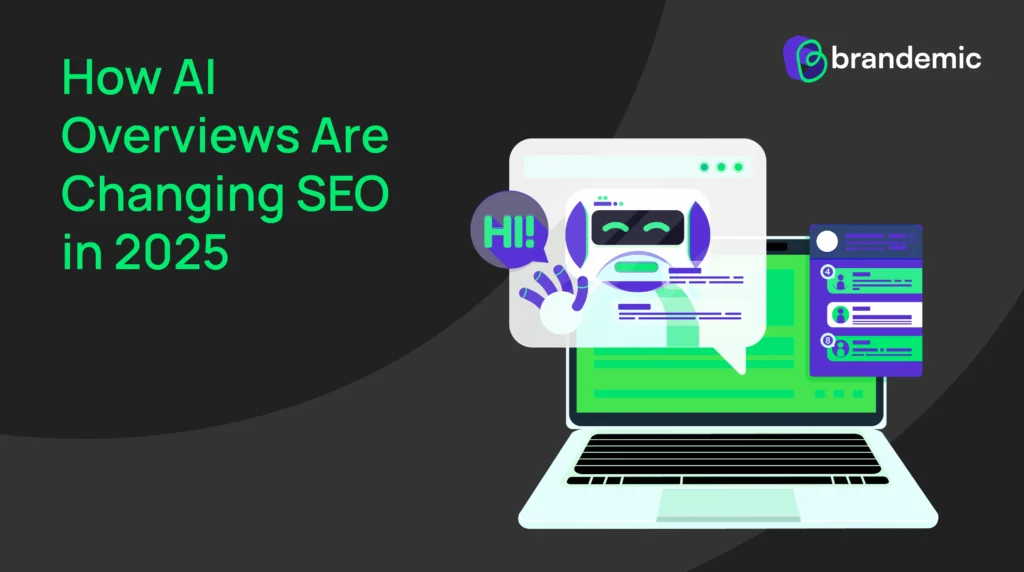Search traffic isn’t just declining- it’s being rerouted. According to new research by Ryan Law at Ahrefs, Google’s AI Overviews are having a measurable and immediate impact on how users interact with search results. After analyzing more than 300,000 keywords, Ahrefs found that when an AI Overview appears on a search engine results page (SERP), click-through rates for the first organic result drop by an average of 34.5%.
That’s not a slight dip that’s a third of your hard-earned traffic gone, even if you’re ranking #1. And this isn’t hypothetical. AI Overviews are already rolling out across U.S. search results, with global expansion expected throughout 2025. These AI-generated answers pull content from top-ranking pages and summarize it right at the top of the SERP which means users often get what they need without ever clicking through to the source.
This shift has major implications for anyone relying on SEO as a core growth channel. It changes how content is surfaced, how value is perceived, and how ROI is measured. And while it may feel like another Google shakeup, this time, the shift isn’t just algorithmic it’s behavioral.
Click intent is being interrupted at the source. And if your strategy is still built on rankings alone, it’s time to adapt.

AI Overviews are Google’s latest evolution of the SERP and they’re quietly rewriting the rules of organic discovery. Previously called “Search Generative Experience” (SGE), AI Overviews are AI-generated answer blocks that now appear above traditional organic listings. Instead of directing users to high-quality content, they summarize key information directly within the search results. These summaries are pulled from multiple sources- often without giving traffic to any of them.
The problem? They’re doing their job a little too well. Users who once clicked through to get context, nuance, or next steps are now being served a polished, AI-written summary that makes clicking feel unnecessary. This shift is visible in the data: Ahrefs’ 2024 study showed that when an AI Overview appears, the average CTR of the #1 organic result drops from 24% to 15.8% a massive drop in visibility for sites that previously owned the top of the page. And this isn’t happening in a niche corner of the internet. According to Ahrefs, 84% of high-volume keywords in their sample had AI Overviews triggered. That means this is no longer an experiment it’s the new normal.
This feature also changes user expectations. Instead of scanning ten blue links, users are retrained to accept a single AI-generated answer as “enough.” And if you’re building content to win attention in this new search reality, visibility now depends on whether and how your content is summarized not just how high it ranks. The implications are clear: ranking #1 is no longer the win it once was. If you’re not in the AI Overview, or if your content is being summarized without attribution or context, you may be losing traffic even while technically ranking well.
This is what makes AI Overviews different from any past update. It doesn’t just reshuffle rankings it reduces the value of being ranked at all.
For years, SEO strategy has centered around one goal: get the click. Whether through keyword optimization, featured snippets, or meta improvements, the objective was always to earn a spot in organic results- and convert that visibility into site visits.
AI Overviews change that equation entirely. With AI-generated summaries appearing at the very top of the page, Google is conditioning users to consume content without ever leaving the SERP. According to the data from Ahrefs, this shift isn’t just noticeable it’s measurable. In results with AI Overviews, clicks to the top-ranking organic result dropped by over 34%, and in many cases, the Overview took up so much real estate that organic results fell below the fold.
With AI-generated summaries appearing at the very top of the page, Google is conditioning users to consume content without ever leaving the SERP. According to the data from Ahrefs, this shift isn’t just noticeable it’s measurable. In results with AI Overviews, clicks to the top-ranking organic result dropped by over 34%, and in many cases, the Overview took up so much real estate that organic results fell below the fold.
The effect is similar to what happened with zero-click searches a few years ago- only now, it’s amplified. Google isn’t just answering questions; it’s rewriting them, formatting them, and personalizing responses based on context. This makes the SERP itself the final destination- not the gateway. As AI Overviews expand to cover everything from product recommendations and how-to guides to definitions and expert answers, user habits are shifting fast. They’re learning to trust the Overview. They’re scanning fewer results. They’re skipping steps in the discovery process. This change in behavior means that content built purely to rank won’t deliver the same results it used to. Visibility is no longer enough. What matters now is being visible inside the Overview- or building a brand strong enough that users bypass Google altogether.
The bottom line? Search behavior is adapting to AI. And if marketers don’t adapt their content strategy with it, traffic losses won’t be a one-time dip they’ll become the default.
One of the biggest benefits of brand collaboration is the ability to tap into a new audience. When two brands join forces, they each gain exposure to the other’s followers, which can significantly boost brand awareness. Studies indicate that co-branded campaigns are 20-30% more effective at driving sales than standalone marketing efforts. This is because brand followers are more likely to trust and engage with a product or service that has been endorsed by a company they already know and support. For influencers, collaboration with brands can also result in higher engagement rates, as audiences tend to respond positively to authentic partnerships.
For years, SEO has been one of the most efficient marketing channels in terms of ROI. Earn the ranking, get the clicks, and convert the traffic- simple. But in 2025, that model is no longer reliable. With AI Overviews now reducing organic click-through rates across the board, brands need to reevaluate what success from search actually looks like.

You can still rank. You can still create exceptional content. But that doesn’t guarantee traffic like it used to. With AI Overviews occupying prime real estate, even the best content may never get seen- or worse, may be summarized and stripped of context, leaving your site out of the conversation entirely. The old expectation of linear growth from ranking improvements needs to evolve. Today, the reward for organic success might not be traffic- it might just be recognition in an AI answer box.

Marketers projecting organic growth based on historical CTR models will find themselves in trouble. Traditional assumptions- like 30% of clicks going to position one- are now outdated. With Google summarizing content directly in the SERP, actual site visits can drop significantly, even if rankings hold steady. Teams that tie success metrics purely to pageviews or session growth may soon struggle to explain why those numbers no longer reflect the work being done.
If SEO is no longer the top-of-funnel volume driver it once was, its role needs to shift. In 2025, organic content should be viewed not just as a traffic engine, but as a credibility tool. It’s about building topical authority, being quoted in AI Overviews, and strengthening your position across search ecosystems- not just SERPs. Brands will need to connect organic performance to secondary benefits like increased branded search, social lift, content reuse, and improved visibility in other channels.
Must Read: Best SEO Agencies in Bangalore
For years, SEO strategy has centered around keyword research, ranking factors, and technical optimization. But in 2025, the most resilient content strategies will be the ones rooted in brand- not just in rankings. Google’s AI Overviews are reshaping how visibility is earned. Instead of rewarding the best-optimized page, they reward the most trustworthy, recognizable sources. And as AI-generated answers continue to pull from top content, creators and companies with strong brand authority are more likely to be featured, quoted, or referenced- even if they don’t hold the top ranking.
This shift forces a bigger question: what happens when clicks dry up, but awareness still matters? That’s why ownable platforms are becoming more important than ever. Email lists, newsletters, podcasts, and private communities give creators and marketers direct access to their audience- without relying on algorithmic gatekeepers. These channels don’t just offer protection from platform shifts; they offer leverage.
In this new landscape, SEO is no longer a traffic-only play. It’s a trust play. And that changes how we measure content success. Winning strategies in 2025 will prioritize visibility, brand lift, and thought leadership- not just keyword volume or SERP position. The smartest marketers will use SEO to build memory, not just clicks. Because when you’re competing against AI, the best thing you can do is be too human- too real- to ignore.
AI Overviews aren’t just a new feature- they’re a fundamental shift in how search works. As Google continues to push AI-generated answers to the top of the SERP, organic traffic will get harder to earn, and traditional SEO playbooks will deliver diminishing returns. But that doesn’t mean SEO is dead. It means it’s evolving.
Marketers need to reset expectations. Ranking #1 no longer guarantees traffic. Click-through rates are dropping, and zero-click searches are on the rise. If you’re still using 2018 strategies in a 2025 algorithm, you’re not just falling behind- you’re being replaced by a summary box. To thrive now, SEO must go deeper. It has to serve the brand. It has to build trust. And it has to coexist with AI, not compete with it. That means creating content worth referencing, building domain authority that earns a place in Overviews, and investing in platforms that you own- not rent.
The new search landscape belongs to brands that are clear, consistent, and credible. If your content drives recognition, recall, and trust- even if the clicks shrink- you’re still winning.
In 2025, SEO isn’t dying—it’s transforming. As AI Overviews dominate SERPs, the game is no longer just about rankings or traffic, but about trust, authority, and visibility where it matters most. Brands that focus on building real value, strong reputations, and ownable content ecosystems will thrive, even as clicks decline. The strategies that win now are human-centered, brand-driven, and AI-aware. SEO success in this new era isn’t about outsmarting algorithms—it’s about being the source AI can’t ignore.
AI Overviews are Google-generated answer summaries that appear above organic search results. They reduce the need for users to click through, which can lead to a 34% drop in click-through rates for the top-ranking result.
Yes, but the value is shifting. Instead of focusing solely on traffic, modern SEO will prioritize brand visibility, authority, and inclusion in AI-generated responses. Success metrics must evolve with the SERP.
Marketers should move toward brand-driven content, ownable distribution (like email), and deeper integration with platforms that can’t be disrupted by Google. Keywords still matter, but trust is becoming the top-ranking factor.